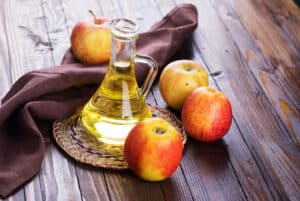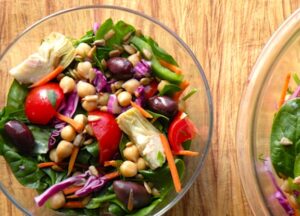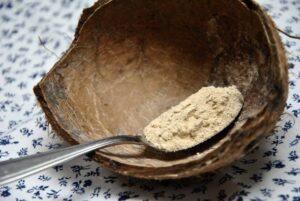Bone health is a complex and multifactorial process. Bone mass accumulates most during the first couple decades of life. The more bone gained during this period, the less risk of osteoporosis you face later in life. Unfortunately, this critical window closes before most young people even hear the word osteoporosis. If you did know to focus on bone-building during your teenage years, what would you actually do? The same things you should do at any age to optimize bone density.
Interestingly, the number-one factor for improving and maintaining bone health isn't at all food related: the best way to build bone is to perform weight-bearing exercise regularly. Resistance exercise improves bone density more than any dietary factor. Lift weights, walk, jog, jump, or do callisthenic exercises at least three or four times a week to keep your bones, muscles, tendons, and ligaments strong and pliable.
Nutritional recommendations include eating adequate amounts of fruits and vegetables, cutting out dairy, maintaining optimal vitamin D levels, and consuming plant-based sources of calcium every day.
Vitamin D plays an important role in bone mineralization, working with calcium to break down old bone cells and build up new ones. You can be sure you're getting enough vitamin D with a simple blood test. Remember from Chapter 3 that the ideal result of the 25-hydroxyvitamin D test is at least 50 ng/mL.
If you're not there (like the vast majority of the population), try spending 15 to 20 minutes in the sun three times a week. Apply sunscreen only to your face, exposing your arms, legs, and whatever else you can reveal without offending the neighbors. The sun is the best source for vitamin D. Sun-derived D stays in the body the longest, and you can't get vitamin D toxicity from the sun. The sun offers other health benefits—it releases feel-good endorphins and regulates your circadian rhythm.
If after a few weeks you're still testing low, consider supplementing with vitamin D2. You can safely start out with 1,000 to 2,000 IU per day. If you're deficient, taking 5,000 to 6,000 IU per day for two or three months is safe. Please check your blood levels before supplementing, and ask your physician to monitor and help you reach your goals.
Excerpted by permission from The Complete Idiot’s Guide to Plant-Based Nutrition* by Julieanna Hever, MS, R.D., Alpha Books © 2011.
Julieanna Hever is a plant-based dietitian who is also a personal trainer and a health and nutrition counselor. Hever gives many lectures and writes columns for various publications. See the review of The Complete Idiot’s Guide to Gluten-Free Vegan Cooking* on VegKitchen. Visit Julieanna's web site, The Plant-Based Dietitian.
- For more tips on plant-based nutrition, make sure to browse VegKitchen’s Nutrition page.
- For lots more features on healthy lifestyle, please explore VegKitchen’s Healthy Vegan Kitchen page.
*This post contains affiliate links. If the product is purchased by linking through this review, VegKitchen receives a modest commission, which helps maintain our site and helps it to continue growing!






Ivana Wilson says
Are you quite sure that it is vitamin D2, and not D3, that should be taken? Most other sources recommend D3.
Nava says
Ivana, you're right that most of the time, D3 is recommended, and it's more absorbable. However, most D3 is from animal sources like sheep lanolin. Julieanna is a dietitian with a plant-based orientation, so that's why she recommends D2. I have found a plant-based source of D3 from a brand called Mega Food.
No matter what, the sun is the best and most absorbable source of vitamin D. Hope that helps!
Julieanna Hever says
Actually, there is evidence suggesting both D2 and D3 are absorbed equally well. There is also some research suggesting you may need more D2 to equal the effect of D3, but either source can help raise your serum vitamin D levels. I recommend D2 to anyone who is vegan for ethical reasons as D3 is made from animals and there does not seem to be an overwhelming benefit to opting for the D3 over the D2.
Nava says
Thanks for weighing in, Julieanna.
wanda Arbaugh says
I have osteoporosis and I am 72 years old. I have been taking a supplement called Bone-Up which I take 4 a day but would like to switch to a plant based supplement. Would you please recommend one. Algae Cal is too expensive so please recommend something else. I also take an organic super green in the morning. I also take D3 capsule. And I walk every day. I would appreciate any information you could give me. Thank you.